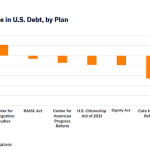
UK companies receiving credit upgrades have outweighed downgrades for the first time in a decade, but the improvement could be difficult to sustain.
The leisure and transport industries have led the upgrades in 2023, benefiting from a delayed recovery from pandemic travel restrictions, S&P Global Ratings said.
There were 27 corporate credit upgrades, compared with 19 downgrades, far better than a net three downgrades the year before and a net 35 in 2019. The last time movements were net positive was in 2013.
British Airways and its parent, International Consolidated Airlines, regained their investment-grade credit ratings in September after upgrades from S&P, and easyJet’s rating was also raised. Tight capacity and a rebound in travel has caused air fares to soar, boosting profits for some airlines to record levels during the peak summer season.
However, companies still face a “hangover” of higher interest rates, slow economic growth and increased debt in 2024, Paul Watters, S&P Global Ratings head of European corporate research, said.
Low interest rates prompted many companies to agree financing in the years immediately before the pandemic hit, Watters said, which means there will be a wave of debt falling due in 2025 and 2026 that companies will need to refinance ahead of time to maintain liquidity. Companies will be locking in debt at higher rates.
“We are expecting to see a gradual deterioration in Europe for the more vulnerable credit, those exposed to higher rates,” Watters said.
Yet UK companies are in a more challenging position than their European counterparts, he said, due to core inflation, the overall growth outlook and an expected general election.
“A key variable to watch is the overall growth environment, the extent to which you have a stagnating economy, then that makes it much harder for companies to protect their credit quality of their top line and earnings are under pressure.”
Rating pressure across Europe is most likely to be felt in the real estate sector in 2024, he said. The rapid rise in interest rates has pushed down valuations for property companies and caused loan-to-value ratios, often a condition of financing arrangements, to worsen.
S&P’s outlook bias, an indication of whether a company’s credit rating will be upgraded or downgraded over the next two or three years, has worsened to a net 30 per cent negative for the sector. The outlook for retailers has also deteriorated as consumer spending has weakened.
Read more:
UK companies receive more credit upgrades than downgrades for first time in a decade






